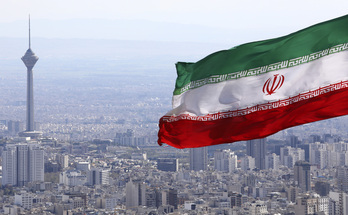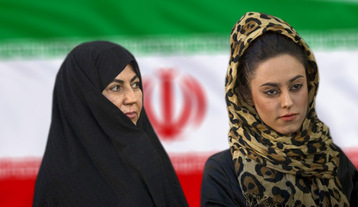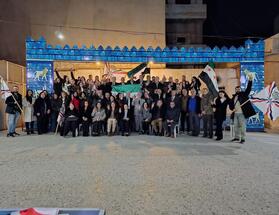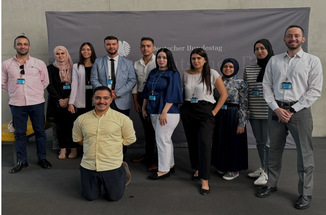-
Countdown to Justice: How Mahmoud Hamoud’s Ordeal Illuminates the Urgency of the Upcoming ICJ Hearing on Syria

With the first hearing at the International Court of Justice set for October 10, Mahmoud Hamoud’s harrowing experience in Syria’s detention centers serves as a stark reminder of the systematic human rights abuses by the Assad regime. His narrative not only exemplifies these abuses but also aligns with the recent Dutch-Canadian legal initiative aimed at holding the regime accountable for its violations.
As the court prepares to examine serious allegations, including torture and the use of chemical weapons, Mahmoud’s journey highlights the importance of U.S. policymakers lending their support to this crucial judicial endeavor and thoughtfully considering a firm stance on the Assad regime’s ongoing violations.
Mahmoud Hamoud’s transformation from a young revolutionary in Syria to an internationally acclaimed film student in Paris is a testament to the indomitable human spirit. Driven by a once-in-a-lifetime movement for change, Mahmoud shattered his own barriers of fear, declaring that he would have “no regrets” if his suffering could lead to holding Assad accountable. Today, his contributions to the media and upcoming films on Syrian detainees are not merely achievements; they are a clarion call for justice and human dignity.
Supporting the ICJ Case against Assad by publicly endorsing the Dutch-Canadian Initiative would contribute to further political setbacks in normalization attempts. The Treasury Department can empower this court by imposing sanctions against Syrian officials implicated in these human rights abuses. Congress can support the ICJ Case by expediting the approval of the Anti-Normalization and Captagon Acts.
The upcoming ICJ hearing is a watershed moment for justice and accountability in Syria. Let Mahmoud’s story be the catalyst that compels us to act, ensuring that the horrors he endured are neither forgotten nor repeated. U.S. policymakers must seize this moment to rally international support for the case against the Assad regime. The evidence is overwhelming, and the need for justice is urgent.
The first violation of the Assad regime: Forced Displacement
At the age of 16, Mahmoud Hamoud took the courageous step of documenting protests and organizing peaceful revolutionary activities at his school in Moadamiyet al-Sham, near Damascus. However, his youthful activism confronted a harsh reality on July 29, 2012. The Syrian regime’s army invaded his city, sparking a wave of arbitrary arrests that swept through the community. Faced with an immediate threat to their safety, Mahmoud and his older sister had no choice but to flee to Lebanon.
Yet, they soon discovered that Lebanon offered little refuge. Hindered by challenging living conditions and the impossibility of balancing education and work, they found themselves at a crossroads. Mahmoud then made the difficult decision to move to Jordan to join his older brother and continue his studies. However, even in Jordan, the challenges persisted, making it impossible for him to pursue his education further. Weighing the risks, Mahmoud made the perilous choice to return to Syria to complete his studies, fully aware of the dangers that awaited him back home.
The second violation of the Assad regime: Child Detention & Baseless Allegations
Mahmoud’s life took another devastating turn on October 14, 2012, at the Syrian-Jordanian border. It was there that he was informed he was wanted by the Air Force Intelligence Branch in Damascus. This would be the last time he would see his family and loved ones for seven and a half long years.
Despite being just seventeen at the time, Mahmoud was accused of financing militants and having knowledge of the locations of ammunition depots in Moadamiyet. Astonishingly, all the charges against him were dated to times when he was verifiably out of the country. Regardless, he was transferred to the Air Force Intelligence Branch in Mezzeh, marking the beginning of a horrifying detention journey that would last for years.
The third violation of the Assad regime: Unleashing Horrifying Torture Horrors to Extract Forced Confessions in Syria
Mahmoud’s testimony about his time in detention is troubling. Upon his first meeting with the head of the deposits department at the branch, he was subjected to physical abuse simply for stating that he was a “school student.” The official took personal offense and had agents lift Mahmoud up while he was kicked several times in the stomach. This reception process alone lasted half an hour.
The torture Mahmoud endured was varied and brutal, including skinning with green borax, ghosting, electrocution, flogging, the wheel, kicking with feet, and even being buried naked in the snow. The severity of the torture was so extreme that Mahmoud confessed to all accusations against him by the third day.
In the second phase of the investigation, Mahmoud was transferred to another officer, who was even more brutal. Despite Mahmoud’s cries and protests of innocence, the officer continued to beat him. Under duress, Mahmoud was forced to say he possessed a Russian AK-47 gunpowder, a weapon he had no knowledge of.
Perhaps the most sadistic form of torture was what Mahmoud describes as “pre-torture” activities. These included ghosting other prisoners, attaching electrical cables to their bodies, and throwing dirty water on them before the actual torture began. Mahmoud states, “Those were the most sadistic and horrific moments during my time in detention.”
The fourth violation of the Assad regime: False Accusations and the ‘Human Slaughterhouse’ in Syrian Detention Centers
After enduring ten grueling months in detention, Mahmoud was burdened with 16 charges, each more ludicrous than the last. He was accused of being an armed combatant against the regime’s army, bombing a police station, and, most absurdly, carrying the Turkish flag during protests—a flag that Mahmoud rightly notes was virtually unheard of in Syria during 2011 and 2012. “I confessed to everything,” Mahmoud admits, emphasizing the extreme conditions that drove him to such a desperate confession.
He remained incarcerated in the Air Force Intelligence Branch at Mezzeh Military Airport in Damascus for an additional two and a half years. Here, he witnessed the transfer of numerous prisoners to Hospital 601, a facility infamously referred to as a “human slaughterhouse” due to the appalling mistreatment of prisoners by supposed medical professionals. Those sent to this facility never returned, as Mahmoud painfully observes.
The fifth violation of the Assad regime: Intelligence Agency Director’s Dominance in Syria’s Unlawful Judicial System and Sentencing
Within the detention center where Mahmoud was held, any semblance of the rule of law or standardized procedures for determining prisoners’ fates was absent. The branch director possessed the authority to arbitrarily decide who would face death sentences and who would be referred to the terrorism court. Al-Mu’tasim al-Kilani, an expert in international and human rights law, clarifies that while field courts issue death sentences, the terrorism court holds the power to release prisoners after years of detention.
Amnesty International has reported that these courts operate beyond the bounds of Syrian law. A former judge has attested that the verdicts were preordained, with court sessions serving as mere formalities. In a preemptive move, Bashar al-Assad issued a decree abolishing these courts, but the Syrian Network for Human Rights has meticulously documented the extensive violations perpetrated by the regime within these judicial proceedings.
The sixth violation of the Assad regime: Cruel Prisoner Transfers and Illegitimate Field Courts in Syria
After enduring two and a half years in detention, Mahmoud, along with 30 other prisoners, was transported to a field court in Damascus. The transfer occurred in what Mahmoud vividly describes as a “meat truck,” underscoring the dehumanizing conditions. Upon arrival, they were confined to a cramped room.
Within this confined space, prisoners were interrogated in groups of five to complete personal data forms. Subsequently, each of them was individually ushered into a courtroom, which was sparsely furnished, housing only a desk, some furniture, and Three individuals: Judge Sheikh Jaber Al-Kharban and two others.
The Seventh violation of the Assad regime: Summary Execution Verdict in a 90-Second Session
In what can only be described as a travesty of justice, Mahmoud’s entire judicial session in the field court lasted a mere one and a half minutes. He was initially asked about his name and place of birth, followed by questions about his involvement in filming protests and posting them on social media. The pivotal moment came when he was questioned about possessing a weapon. Mahmoud tried to clarify that his confession was extracted under torture and even offered to show physical evidence of his injuries. However, before he could present his passport as proof of his absence from Syria during the period he was accused of, the judge tore up the document and threw it in his face. The judge then issued a summary verdict of “execution of a minor,” which translates to life imprisonment without the possibility of parole.
The eighth violation of the Assad regime: Saydnaya Prison – A Death Sentence Beyond the Courtroom
Mahmoud was transferred to the notorious Saydnaya prison after receiving his life imprisonment sentence. During his five-month stay, 30 of the prisoners who had been to court with him were executed. Additionally, 15 inmates in his cell lost their lives due to torture. Among them was Ahmed Ibrahim Masalma, who died from thirst.
Following the issuance of death sentences, Mahmoud and his fellow prisoners were transferred to Saydnaya prison. During his five-month stay, Mahmoud witnessed the execution of 30 prisoners who had been to court with him. Additionally, 15 individuals in his cell lost their lives due to torture. Among them was Ahmed Ibrahim Masalma, who died from extreme thirst.
The ninth violation of the Assad regime: Prolonged Detention and Arbitrary Release of Minors
After surviving the harrowing conditions at Saydnaya prison, Mahmoud and other minors were transferred to Balloon Prison in Homs. They remained there for a year and a month before being moved to Adra Prison, where Mahmoud spent an additional three and a half years. He was finally released on September 15, 2019, under a presidential pardon that included minors sentenced to “execution of a minor.” Alongside Mahmoud, 99 other individuals were also released. However, Mahmoud’s story is not an isolated case; approximately 5,213 children are still arbitrarily detained and are among the forcibly disappeared in Syria.
Conclusion:
Mahmoud’s deeply challenging journey, marked by a litany of regime violations, resonates as an urgent call to action. With the International Court of Justice poised to scrutinize the Assad regime’s alleged atrocities in a mere ten days, Mahmoud’s narrative demands the unwavering attention of U.S. policymakers. Supporting this pivotal judicial process transcends the bounds of justice; it stands as a pivotal stride towards terminating the vicious cycle of abuse and impunity that has relentlessly plagued Syria.
These transgressions, encompassing concocted charges, barbaric torture methods, spurious field trials, and rushed courtroom verdicts, underscore the gravity of the situation. Additionally, the protracted detention of Mahmoud and countless underage detainees, coupled with arbitrary releases, lays bare a stark absence of justice and respect for human rights.
This issue poses an immense challenge to the global community, serving as an emphatic reminder of the imperative to secure justice and accountability in Syria. The forthcoming ICJ hearing signifies a turning point in the quest for justice and accountability in Syria’s tumultuous history. Let Mahmoud’s story be the driving force that galvanizes us to take resolute action, ensuring that the trials he endured neither fade into oblivion nor repeat themselves.
BY: americancenter
Tags
You May Also Like
Popular Posts
Caricature
Syrians' concerns now
- December 10, 2024
Syrians' concerns now #Syria
#Bashar_al-Assad
#Liberation_of_Syria
#Syrians
#Future_of_Syria
#Levant_News

opinion
Report
ads
Newsletter
Subscribe to our mailing list to get the new updates!




















